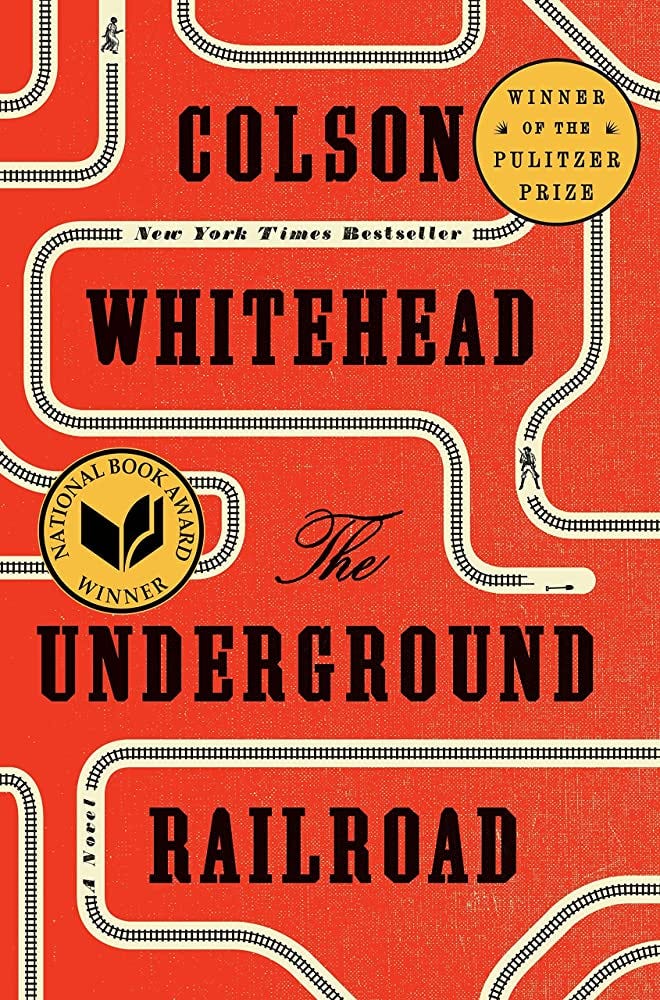12 Years a Slave and More: Colson Whitehead’s “Underground Railroad”
Slavery narratives and progress
This is an essay from my ebook Nazi Dreams: Films About Fascism. The entire ebook is uploaded at the end of this post as a pdf for paid subscribers.
You can find an index of all my substack posts on fascism here.
Slavery narratives in pop culture are usually stories about progress. At the beginning of the narrative, the black protagonist is enslaved, and suffers from cruelty, violence, and the gross injustices of white supremacy and inhumanity. Then, eventually, by the end of the story, the enslaved person escapes.
The narrative arc is from despair to catharsis; time frees and heals. Things get better — not just because the end of the story is an improvement on the beginning, but because the liberation of the story parallels the supposedly liberatory movement of history. An enslaved person was freed in the narrative just as in history slavery has been abolished. Even in a time travel story like Octavia Butler’s Kindred, in which the protagonist falls into the past, the story resolves with a leap back to the present, liberation, and new life. Slavery haunts the present…but it’s still dead.
Colson Whitehead’s The Underground Railroad suggests, on the other hand, that slavery never died. The buried train tunnel which carry his protagonist Cora from bondage in Georgia don’t deliver her to freedom. Instead, they take her to different kinds of abuse, imprisonment, and horror.
Whitehead’s novel is deliberately ahistorical — and as a result, the clear progression from slave to free is scrambled and uncertain. Each state Cora visits is based on a different era, but all those eras are, somehow, already embedded in slavery. In South Carolina, the seemingly progressive white people practice sterilization and have set up the Tuskegee syphilis experiments some 80 years before they were actually performed in the 1930s. In Indiana, Cora experiences a violent attack on a black community, some 30 years before the post-Reconstruction era of sweeping KKK violence. And in North Carolina, the white people of the state have instituted a Final Solution; all black people in the state are murdered and hanged along the so-called Freedom Highway, which stretches for miles. Cora hides in an attic for months, like Anne Frank, while her white allies endure totalitarian terror, house searches, the suspicion of neighbors — and finally discovery and death.
It’s generally a bad idea to appropriate the experience of Holocaust victims. But turning North Carolina into Nazi Germany isn’t really appropriation. Hitler admired and was inspired by American racism and by American eugenics. The United States has not, as of yet, instituted a Nazi-level program of racial extermination, but outright genocide has long been an implicit potential in a system that tolerated slavery, Jim Crow, and mass imprisonment. Slavery in the United States was a precursor to Nazism. Auschwitz floated on the Middle Passage before it was constructed in Germany.
If slavery is Jim Crow, is eugenics, is fascism, then progress is an illusion. Cora gets on the magical, mysterious train to take her away from torture and oppression, but when she gets off at the next station, she is back where she started. Time goes forward, but white people still hate, torture, and kill black people. Slavery isn’t something left behind at the last station. It’s not a ghost which haunts the present. It’s right here. The new fascism is the old fascism is the new fascism.
Indeed, Whitehead’s North Carolina has a contemporary American cast.
Cora thought that the whites would be loath to give up their freedoms, even in the name of security. Far from instilling resentment, Martin told her, the patrollers’ diligence was a point of pride from county to county. Patriots boasted of how often they’d been searched and given a clean bill.
This is certainly a reference to airport security theater, in which Americans tell themselves they are enduring inconvenience and humiliation for the greater cause of civic preparedness. But it’s also applicable to America’s police state more generally, and the escalating, histrionic calls to honor and respect the people paid to police you on behalf of the state. Be grateful that police intimidate and humiliate you in small ways, white people. Otherwise, how can you ensure that they will intimidate, humiliate, and kill black people on your behalf? Persecution of minorities is the excuse and the justification for totalitarianism. Racism is not an unfortunate adjunct to totalitarianism; it’s the basis of the system.
That system is still up and running. The landscape of Whitehead’s South is not a past landscape. If Cora had made it to New York, she probably would have found Trump squatting there, mumbling about the need for a wall. At the end of the novel, Cora does move on to some unspecified North, where she hopes she has finally escaped. She looks to Missouri, to California, to the future. But she’s had such hopes before. In the last line of the novel, she looks at her companion, and, “she wondered where he escaped from, how bad it was, and how far he traveled before he put it behind him.” Cora has not traveled far enough, and maybe never will. There might not be far enough, or long enough to travel.
“A plantation was a plantation; one might think one’s misfortunes distinct, but the true horror lay in their universality,” Cora thinks. The universality is spatial; plantations spread across the South, and not just the South. But the horror is also temporal. Slavery may have ended, but the plantations are still around. Certainly contemporary America has no shortage of chains or walls or prisons.
Slave narratives are generally inspirational. Stories about fascism often are as well. Solomon Northup escapes; Schindler saves people, and their children put stones on his grave. When the two stories are seen as one story, though, the inspiration sours. Northup, like Cora, leaves the plantation and finds the gas chamber. The descendents of those rescued by Schindler may live in an America of ICE patrols, where refugees are turned away at the border, sent back to death like Holocaust escapees before them. Maybe things get better for a while, for some. But hatred is remarkably stable over time. You can call it slavery, or fascism, or Trumpism; every state has a different name and a slightly different bleak climate. Maybe someday we’ll find a better station, a true north. But not till we admit we haven’t gotten there yet.
You can find an index of all my substack posts on fascism here.
The ebook of Nazi Dreams is past the paywall.




